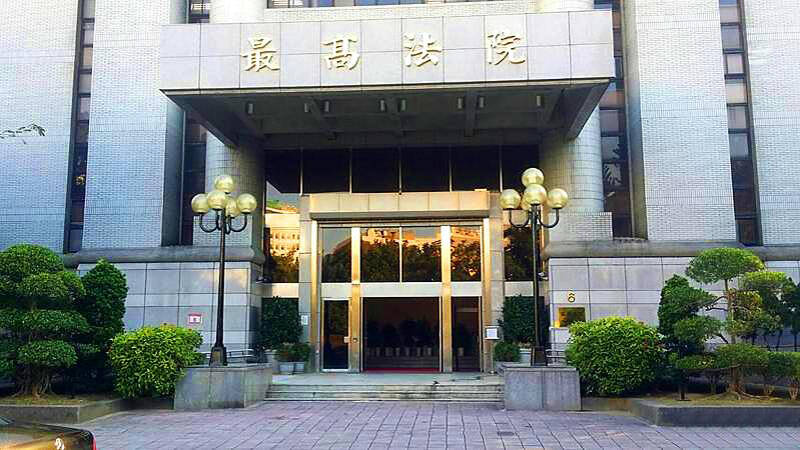The Supreme Court on Friday overturned the death sentence of Liang Yu-chih (梁育誌), who was convicted of murdering a Malaysian university student in 2020, and ordered a new trial.
The ruling by the High Court’s Kaohsiung branch in January failed to thoroughly examine the evidence and did not provide sufficient reasoning, the Supreme Court said.
It was the first case to reconsider a death sentence after the Constitutional Court ruled in September last year that capital punishment is conditionally constitutional.

Photo: Wu Cheng-feng, Taipei Times
The crime occurred on Oct. 28, 2020, when Liang abducted the victim while she was walking alone near her university in Tainan.
He raped, beat and strangled her to death, took her belongings, and dumped her body in a mountainous area of Kaohsiung’s Alian District (阿蓮), the High Court said.
Liang had acted with premeditation, lying in wait with a rope that he used to kill the victim, it said.
The High Court upheld the death sentence on the cruelty of the crime and the high risk of reoffending.
However, the Supreme Court said the trial misapplied the law by treating the incident as a single offense, while it should have been prosecuted as multiple crimes — robbery, sexual assault and murder — with separate penalties.
The court also questioned Liang’s intent, as records suggest he might have initially planned only sexual assault before deciding to commit murder.
Additionally, the court failed to consider a prison counselor’s assessment that Liang had potential for rehabilitation, which might have impacted sentencing, it said.
Liang was first sentenced to death by the Ciaotou District Court in March 2022 for rape, intentional killing and robbery.
The High Court upheld the verdict in March 2023.
In June 2023, the Supreme Court ordered a retrial of the rape and homicide charges, citing flaws in the original ruling.

Taiwan is to commence mass production of the Tien Kung (天弓, “Sky Bow”) III, IV and V missiles by the second quarter of this year if the legislature approves the government’s NT$1.25 trillion (US$39.78 billion) special defense budget, an official said yesterday. Commenting on condition of anonymity, a defense official with knowledge of the matter said that the advanced systems are expected to provide crucial capabilities against ballistic and cruise missiles for the proposed “T-Dome,” an advanced, multi-layered air defense network. The Tien Kung III is an air defense missile with a maximum interception altitude of 35km. The Tien Kung IV and V

The disruption of 941 flights in and out of Taiwan due to China’s large-scale military exercises was no accident, but rather the result of a “quasi-blockade” used to simulate creating the air and sea routes needed for an amphibious landing, a military expert said. The disruptions occurred on Tuesday and lasted about 10 hours as China conducted live-fire drills in the Taiwan Strait. The Civil Aviation Administration (CAA) said the exercises affected 857 international flights and 84 domestic flights, affecting more than 100,000 travelers. Su Tzu-yun (蘇紫雲), a research fellow at the government-sponsored Institute for National Defense and Security Research, said the air

Trips for more than 100,000 international and domestic air travelers could be disrupted as China launches a military exercise around Taiwan today, Taiwan’s Civil Aviation Administration (CAA) said yesterday. The exercise could affect nearly 900 flights scheduled to enter the Taipei Flight Information Region (FIR) during the exercise window, it added. A notice issued by the Chinese Civil Aviation Administration showed there would be seven temporary zones around the Taiwan Strait which would be used for live-fire exercises, lasting from 8am to 6pm today. All aircraft are prohibited from entering during exercise, it says. Taipei FIR has 14 international air routes and

Taiwan lacks effective and cost-efficient armaments to intercept rockets, making the planned “T-Dome” interception system necessary, two experts said on Tuesday. The concerns were raised after China’s military fired two waves of rockets during live-fire drills around Taiwan on Tuesday, part of two-day exercises code-named “Justice Mission 2025.” The first wave involved 17 rockets launched at 9am from Pingtan in China’s Fujian Province, according to Lieutenant General Hsieh Jih-sheng (謝日升) of the Office of the Deputy Chief of the General Staff for Intelligence at the Ministry of National Defense. Those rockets landed 70 nautical miles (129.6km) northeast of Keelung without flying over Taiwan,